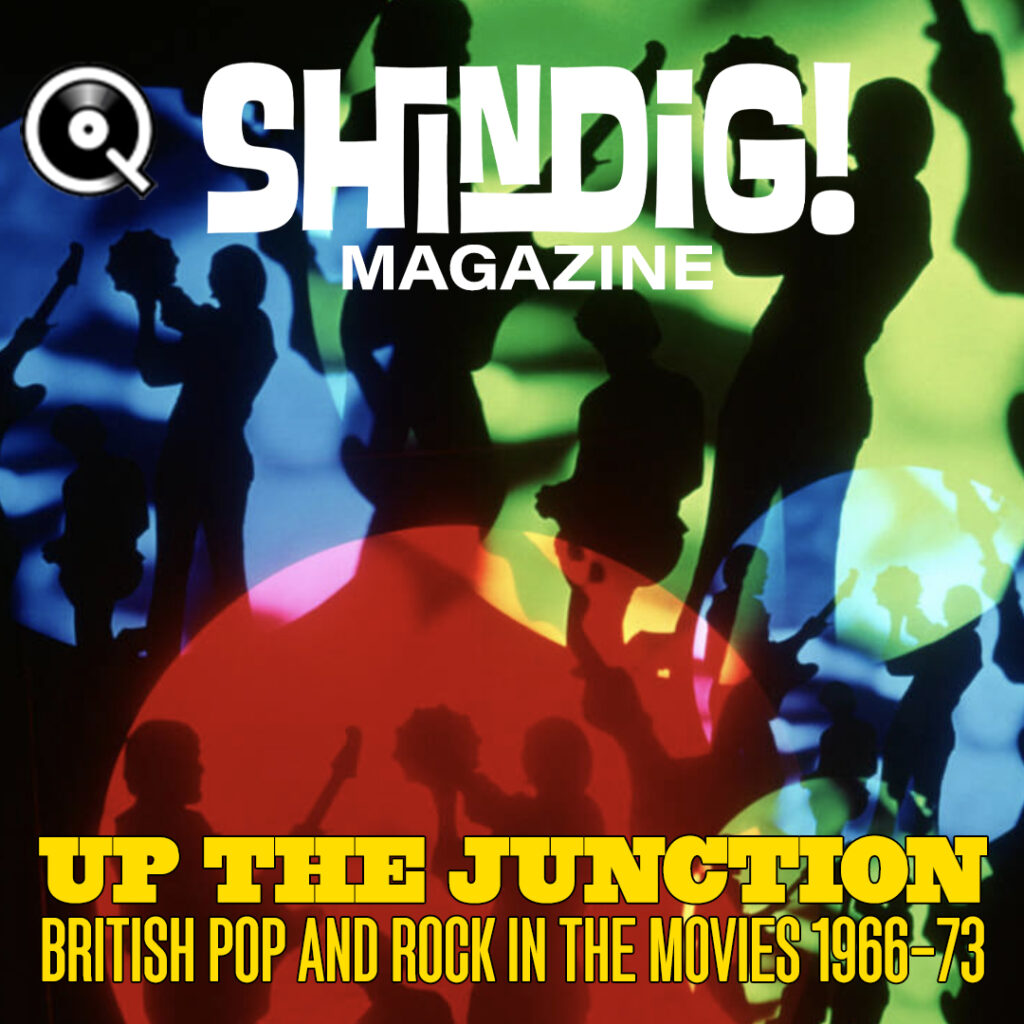Exclusive Shindig! Qobuz playlist #6: Up The Junction – British Pop & Rock In The Movies 1966-73
We’re very excited to be media partners with the truly unique online streaming platform and download store Qobuz. The sixth of our monthly bespoke playlists, which take in all manner of genres and sub-genres, scenes and beyond, then and now, focuses on Brit pop and rock in the movies. Celluloid has never sounded better

Play here or use the scrollable frame with tracklist the bottom of the page. You can sign up for a free trial today. Plans start from £10.83 per month. For more on Qobuz read our interview with MD Dan Mackta here
The moment they stuck Elvis in front of a movie camera in Love Me Tender in 1956 the floodgates opened. Teen heartthrobs on both sides of the Atlantic (hello, Fabian and Cliff) were co-opted to add youth appeal to otherwise anodyne romance and adventure pictures. Seeing your favourite star perform in a movie or even hearing them sing the theme tune was a guarantee of getting young bums on seats.
Once The Beatles had kicked down the doors and redefined the cinematic pop star vehicle forever with A Hard Day’s Night in 1964, a slew of hastily contrived pictures followed in which the likes of Herman’s Hermits and The Dave Clark Five attempted to act while blasting out their latest hit. The advent of Swinging London saw filmmakers dig a little deeper as they invited hip songwriters and cool rock bands to reflect the changing times. By the dawn of the ’70s, even the most anti-establishment underground acts were in on the act.
Our collection focuses on films featuring music by British artists (some made overseas, or by foreign filmmakers) made between 1966 and ’73 (its US counterpart will follow). It opens with the undisputed titans of UK pop: The Beatles and The Rolling Stones. Sort of.
Paul McCartney wrote ‘Love In The Open Air’ for the Boulting Brothers’ melodrama The Family Way during the fabs’ post-touring sabbatical in ’66; George Martin’s arrangement is flawless. Mick Jagger recorded ‘Memo From Turner’ three times (initially with Traffic, more on whom shortly) for Performance, the controversial gangster noir in which he starred. It was released as his first solo single in ’70. On a Beatles-adjacent note, George Harrison enlisted Liverpool group The Remo Four to help him complete the music for ’68 psychedelic reverie Wonderwall, although their own song ‘In The First Place’ was omitted from the soundtrack album.
Bona fide stars who flexed their acting muscles and contributed theme tunes include Lulu (To Sir With Love), Paul Jones (Privilege) and Cilla Black (Work Is A Four Letter Word), while cult singer-songwriter Roy Harper achieved a one-off star billing in gritty ’72 drama Made, for which he composed four songs including ‘Bank Of The Dead’, later included on his album Lifemask.
Rock bands were routinely brought in for the obligatory night club/party scene. Witness The Yardbirds’ guitar-smashing turn in Blow-Up, The Crazy World Of Arthur Brown’s scene-stealing appearance in The Committee, Amen Corner barely visible in Scream And Scream Again and The Freedom gamely lip-synching away in the background in Nerosubianco, for which they wrote and recorded an entire album. The Freedom were formed by ex-members of Procol Harum, whose ‘Salad Days (Are Here Again’) was featured in ’67 drama Separation.
One of Traffic’s first assignments upon their formation in ’67 was to write the theme tune for much-loved sex comedy Here We Go Round The Mulberry Bush, in which Steve Winwood’s former band The Spencer Davis Group make a cameo and contribute the bulk of the soundtrack album. The Kinks managed to knock off an entire album’s worth of music for another sex comedy, ’71’s Percy, the quality and depth of the music far outstripping that of the movie. Similarly, The Tremeloes recorded 14 songs for ’70 Italian thriller May Morning that went unreleased for over 20 years. Five Bee Gees songs found their way into ’71 children’s film Melody (AKA Swalk), with ‘Melody Fair’ from their ’69 album Odessa becoming something of a theme tune. Three Badfinger songs appear in ’70s’s The Magic Christian, including the specially composed ‘Carry On Till Tomorrow’.
Representing the folk-rock community are Donovan, whose music appeared in several films during this period, his theme to Ken Loach’s ’67 kitchen sink drama Poor Cow being the most high-profile; Sandy Denny, whose two contributions to ’71 Danish skin flick Swedish Fly Girls are not only unique to the soundtrack but beg the question, why?; Pentangle, offering an otherwise unavailable epic take of folk standard ‘Tam Lin’ to the ’70 folk-horror oddity of the same title; Third Ear Band, who composed the entire score for Roman Polanski’s grimy ’71 adaptation of Macbeth. Notorious ’70 exploitation film Permissive fictionalised the downbeat adventures of real-life band Forever More, who are seen performing in several scenes. (The soundtrack also features cuts by cult heroes Comus and Titus Groan.)
Elsewhere we find individual tracks by a bewildering array of artists being employed as theme tunes or making ad-hoc appearances in all manner of celluloid outings: Cat Stevens in Deep End, Alan Price in O Lucky Man!, Katch 22 in Baby Doll, The Foundations in Take A Girl Like You, Nirvana in The Touchables, Don Partridge in Otley, Roger Waters & Ron Geesin in The Body, and The Hollies (“assisted” by the film’s star Peter Sellers) in After The Fox.
We end almost as we began, with Billy Fury – a genuine British rock ’n’ roll star equally at home in the worlds of singing and acting – as he tears through The Who’s ‘Long Live Rock’, immortalised in a scene in ’73 coming-of-age drama That’ll Be The Day, set in the singer’s formative late ’50s heyday.
The moment they stuck Elvis in front of a movie camera in Love Me Tender in 1956 the floodgates opened. Teen heartthrobs on both sides of the Atlantic (hello, Fabian and Cliff) were co-opted to add youth appeal to otherwise anodyne romance and adventure pictures. Seeing your favourite star perform in a movie or even hearing them sing the theme tune was a guarantee of getting young bums on seats.
Once The Beatles had kicked down the doors and redefined the cinematic pop star vehicle forever with A Hard Day’s Night in 1964, a slew of hastily contrived pictures followed in which the likes of Herman’s Hermits and The Dave Clark Five attempted to act while blasting out their latest hit. The advent of Swinging London saw filmmakers dig a little deeper as they invited hip songwriters and cool rock bands to reflect the changing times. By the dawn of the ’70s, even the most anti-establishment underground acts were in on the act.
Our collection focuses on films featuring music by British artists (some made overseas, or by foreign filmmakers) made between 1966 and ’73 (its US counterpart will follow). It opens with the undisputed titans of UK pop: The Beatles and The Rolling Stones. Sort of.
Paul McCartney wrote ‘Love In The Open Air’ for the Boulting Brothers’ melodrama The Family Way during the fabs’ post-touring sabbatical in ’66; George Martin’s arrangement is flawless. Mick Jagger recorded ‘Memo From Turner’ three times (initially with Traffic, more on whom shortly) for Performance, the controversial gangster noir in which he starred. It was released as his first solo single in ’70. On a Beatles-adjacent note, George Harrison enlisted Liverpool group The Remo Four to help him complete the music for ’68 psychedelic reverie Wonderwall, although their own song ‘In The First Place’ was omitted from the soundtrack album.
Bona fide stars who flexed their acting muscles and contributed theme tunes include Lulu (To Sir With Love), Paul Jones (Privilege) and Cilla Black (Work Is A Four Letter Word), while cult singer-songwriter Roy Harper achieved a one-off star billing in gritty ’72 drama Made, for which he composed four songs including ‘Bank Of The Dead’, later included on his album Lifemask.
Rock bands were routinely brought in for the obligatory night club/party scene. Witness The Yardbirds’ guitar-smashing turn in Blow-Up, The Crazy World Of Arthur Brown’s scene-stealing appearance in The Committee, Amen Corner barely visible in Scream And Scream Again and The Freedom gamely lip-synching away in the background in Nerosubianco, for which they wrote and recorded an entire album. The Freedom were formed by ex-members of Procol Harum, whose ‘Salad Days (Are Here Again’) was featured in ’67 drama Separation.
One of Traffic’s first assignments upon their formation in ’67 was to write the theme tune for much-loved sex comedy Here We Go Round The Mulberry Bush, in which Steve Winwood’s former band The Spencer Davis Group make a cameo and contribute the bulk of the soundtrack album. The Kinks managed to knock off an entire album’s worth of music for another sex comedy, ’71’s Percy, the quality and depth of the music far outstripping that of the movie. Similarly, The Tremeloes recorded 14 songs for ’70 Italian thriller May Morning that went unreleased for over 20 years. Five Bee Gees songs found their way into ’71 children’s film Melody (AKA Swalk), with ‘Melody Fair’ from their ’69 album Odessa becoming something of a theme tune. Three Badfinger songs appear in ’70s’s The Magic Christian, including the specially composed ‘Carry On Till Tomorrow’.
Representing the folk-rock community are Donovan, whose music appeared in several films during this period, his theme to Ken Loach’s ’67 kitchen sink drama Poor Cow being the most high-profile; Sandy Denny, whose two contributions to ’71 Danish skin flick Swedish Fly Girls are not only unique to the soundtrack but beg the question, why?; Pentangle, offering an otherwise unavailable epic take of folk standard ‘Tam Lin’ to the ’70 folk-horror oddity of the same title; Third Ear Band, who composed the entire score for Roman Polanski’s grimy ’71 adaptation of Macbeth. Notorious ’70 exploitation film Permissive fictionalised the downbeat adventures of real-life band Forever More, who are seen performing in several scenes. (The soundtrack also features cuts by cult heroes Comus and Titus Groan.)
Elsewhere we find individual tracks by a bewildering array of artists being employed as theme tunes or making ad-hoc appearances in all manner of celluloid outings: Cat Stevens in Deep End, Alan Price in O Lucky Man!, Katch 22 in Baby Doll, The Foundations in Take A Girl Like You, Nirvana in The Touchables, Don Partridge in Otley, Roger Waters & Ron Geesin in The Body, and The Hollies (“assisted” by the film’s star Peter Sellers) in After The Fox.
We end almost as we began, with Billy Fury – a genuine British rock ’n’ roll star equally at home in the worlds of singing and acting – as he tears through The Who’s ‘Long Live Rock’, immortalised in a scene in ’73 coming-of-age drama That’ll Be The Day, set in the singer’s formative late ’50s heyday.
© Andy Morten/Shindig! magazine in partnership with Qobuz


